Bev Jackson was at the inaugural meeting of the Gay Liberation Front at the London School of Economics in October 1970. She was the only woman there.
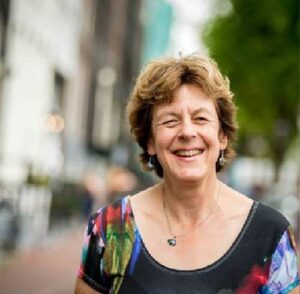 Now Jackson is helping to lead LGB Alliance, which she co-founded with Kate Harris, in its fight against the promotion of gender identity policies and their corrosive impact on lesbians’ and gay men’s lives. And LGB Alliance enjoys the support of another of the Gay Liberation Front’s founders, as she revealed to David Bridle.
Now Jackson is helping to lead LGB Alliance, which she co-founded with Kate Harris, in its fight against the promotion of gender identity policies and their corrosive impact on lesbians’ and gay men’s lives. And LGB Alliance enjoys the support of another of the Gay Liberation Front’s founders, as she revealed to David Bridle.
How did you first hear about the Gay Liberation Front meeting?
I was a student at LSE. I started there in 1969, I was studying maths, and I walked down the corridor and I saw a poster which said: “First meeting of the UK Gay Liberation Front.” It was the most astonishing thing because I had to translate it in my head as to what it might mean. I had heard that “Gay” was a new word for homosexual, and I knew “Liberation” was about freedom and “Front” sounded a bit militant. It sounded very exciting and I thought “I think I want to be on there that sounds right.” I went to this first meeting and there were 19 men there, and just one woman – me – so I was immediately voted on to the steering committee.
What happened in the first meeting?
Aubrey Walter and Bob Mellors had just come back from the United States where they’d been at the Revolutionary People’s Constitutional Convention in Philadelphia, a meeting called by the Black Panther Party. They were real liberationists and it was very clear that this was going to be a revolutionary movement. What was very clear from the beginning was that gay liberation must be aligned with women’s liberation because they wanted to break through the sexist principles that society was based on. That was the theory anyway. At the second meeting there were a few more women.
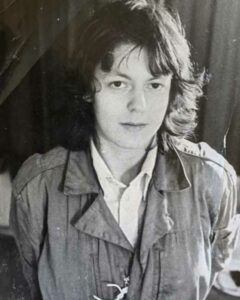
19-year-old Bev Jackson was a student at LSE in 1970
How did the gay men and lesbian women get on?
I did notice that while a lot of the gay men were very interested in aligning with the women’s movement and breaking through sexist role patterns, there was also a certain amount of misogyny among some of the gay men. I can remember thinking it’s going to be difficult for men and women to work together. I was among the minority of lesbians who decided to work within gay liberation; most lesbians worked within women’s liberation because of feeling more in common with other women’s issues. The fact of lesbians being doubly oppressed both as women and as homosexuals is just a really important part of understanding what it means to be a lesbian. Some men really get that – and some men really don’t.
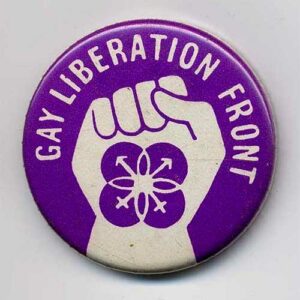
What was the first Gay Liberation Front demonstration?
We organised our first demo in November 1970 at Highbury Fields and that was just astonishing. We’re demonstrating and there’s crowds lining the street looking at us in disgust. It really is quite something to be walking down the street and to see these people looking at you with revulsion in their faces. You stand taller because you think we’re together and we’re out. Our main message was “Come out of the closet”, show the world there’s lots and lots of gays and lesbians – and your ideas about them are all wrong. I was the spokesperson for the demonstration and my telephone was the number for Gay Liberation Front. I spoke to the reporter at The Times and I said “It is important to know that we are not ashamed to be homosexual”. For years I thought what a very mild and rather timid thing to have said.
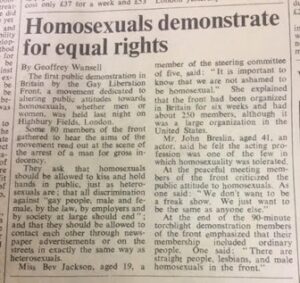
Bev Jackson spoke to The Times: “It is important to know that we are not ashamed to be homosexual”
How do you feel about that now in 2021?
I look back now and I think – God, we have to say the same thing again – that is insane! What on earth has happened? That’s what drives us, the idea that our legacy has been trashed. They’re making homosexual into a dirty word and even trying to avoid saying “gay” and “lesbian”. We’re not a string of letters. It’s absolutely fine to be attracted to people of the same sex. It’s beautiful. It’s wonderful. The idea that people are reintroducing the notion of shame into same-sex sexual orientation is quite appalling.
What was your most important experience growing up?
When I was 11 years old I went to a new school and I really wanted to make friends but I was Jewish in a very anti-Semitic neighbourhood. We had this teacher who kept making anti-Semitic remarks and then at one point she looked around and said “I suppose nobody here is Jewish?” And the whole class burst out laughing. They thought that was such a hilarious idea that anybody in the class could be Jewish – and I put my hand up. I said, “Please Miss, I have some Jewish relations” – in fact I’m totally Jewish – and then I had to go to the toilet and throw up. Later my class teacher found out and she said if anybody made any anti-Semitic remarks again, I should tell her and she’d kick them down the stairs. So it wasn’t the case that everybody was anti-Semitic. Having found myself able to speak out at that time, feeling the terror of being alone, but also the need to say the truth, that’s been the most important moment of my life. It made me strong. It enabled me to come out as a lesbian in a very hostile homophobic environment when I was 16 and it’s enabled me now to stand up against the forces in the wider LGBTQIA+ movement as someone who is critical of the whole concept of gender identity.
I look back now and I think – God, we have to say the same thing again – that is insane! What on earth has happened? That’s what drives us, the idea that our legacy has been trashed. They’re making homosexual into a dirty word and even trying to avoid saying “gay” and “lesbian”. We’re not a string of letters. It’s absolutely fine to be attracted to people of the same sex. It’s beautiful. It’s wonderful. The idea that people are reintroducing the notion of shame into same-sex sexual orientation is quite appalling.
Was there a point – prior to the formation of LGB Alliance – when you personally followed the issues around gender identity and their impact on same-sex attraction?
In 2015 I was mostly involved with refugee rights. I worked with refugees on the island of Lesbos and I wrote a book about it. I was only vaguely aware of what was going on in terms of the LGB rights movement. I remember at Christmas 2016 expressing my views about children thinking there was something wrong with their bodies, and changing their bodies, and being critical of this. I discovered that this was seen as quite a reactionary view and I thought that was odd. It didn’t seem reactionary to me. So I started researching it and the more I researched it the more worried I became. What was happening that young lesbians were no longer welcome in the LGBT rights movement? It just didn’t seem possible and I thought people must be exaggerating. I researched it more and more, and then came that moment in 2018 when Angela Wild went to the front of the Pride march with her “Get the L Out” group, and I thought “what is she doing?” I soon realised that this action had actually been quite necessary because it attracted attention and focused people’s minds.
You wrote to Ruth Hunt who was then in charge of Stonewall?
I wrote her a very long letter with all my concerns about young lesbians having nowhere to meet, not being able to call themselves lesbians any more, about the way in which people were encouraging children to think that they might be born in the wrong body and a whole range of other concerns that really worried me. She didn’t write back. She ignored my concerns. Eventually I published the whole letter on Twitter because I wasn’t going to get a response. I also wrote to other people at Stonewall saying, “Can we talk please? I’m one of the founding members of the Gay Liberation Front and I’m concerned.”
What happened to Stonewall in the years prior?
What happened is in 2015 Ruth Hunt decided to add the T to LGB. It was basically following what had happened in the United States. In the US it had been LGBT much longer than that and there was pressure on her to do the same. Since the T has been added to Stonewall the whole ethos has changed. The emphasis is now all on gender identity. The issue is presented as if it’s about trans rights, but it isn’t really. I don’t know what a middle-aged man who’s got several children and then decides he’s a woman has in common with a 14-year-old girl who is feeling distressed for various reasons and feels that she must be a boy. It’s very difficult to see that those two people can come under the same heading. According to Stonewall’s website, “trans” includes crossdressers or people who are male part of the week and female another part, and people who are non-binary – and it’s not clear what that means either. None of these words are defined and therefore you don’t know what you’re talking about half the time. Laws are based on facts and it’s really important to define the words that are used. The shocking thing that’s happened at Stonewall, and at all LGBTQ+ organisations, is that the word “sex” has been replaced by “gender”. This is not a small thing. Instead of “same-sex attraction” they now talk about “same-gender attraction”.
Here’s this young lesbian standing up against this clinic and on the other side you’ve got Stonewall opposing her. How is this possible and why are people not seeing that Stonewall has stopped supporting gay and lesbian rights and is instead promoting gender ideology or whatever you want to call it?
What do people like Stonewall think gender means?
A lot of the gender identity campaign is about changing the meanings of words or making words slippery. So you don’t quite know what you’re talking about. Gender is one of the worst examples. As soon as they try to explain it they end up with stereotypes. There isn’t any other way to do it. What can it possibly mean? Is there some sort of girly essence that can live inside a male body? That is just the most sexist thing I’ve ever heard. It’s not progressive. It’s awful. It seems to me that this whole idea of gender identity has been stuck in between reality – which is the sex of your body, you’re male or female – and the imagination, the feelings you might have, as a sort of intermediate thing. It’s kind of loosening people’s grip on reality. Look: you can be a lovely gentle male and you can wear dresses and you can call yourself Lilian and it’s absolutely fine. But you’re still a male and you can imagine you might be all sorts of things, but you’re still a male. And with girls what’s going on is really unfortunate, a kind of way to escape from being a woman because it’s not very easy to be a girl growing up.
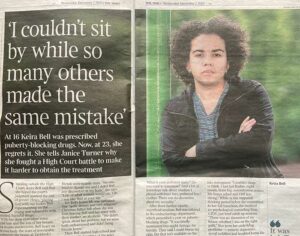
Keira Bell interviewed by Janice Turner in The Times
Can you talk about the Keira Bell case?
Most astonishingly perhaps you’ve got Stonewall opposing Keira Bell, this young lesbian who sued the Tavistock GIDS Clinic for not giving her the care she had needed. Instead she was given puberty blockers and had her breasts removed and she now knows it was all a mistake. She won her case. The judges used the word “surprised” I think five times in the judgment because they were astonished that the clinic doesn’t keep proper records, doesn’t know the proportion of child patients who are on the autistic spectrum, doesn’t follow up patients after treatment, doesn’t keep notes on consent, doesn’t have evidence for the treatment. Here’s this young lesbian standing up against this clinic and on the other side you’ve got Stonewall opposing her. How is this possible and why are people not seeing that Stonewall has stopped supporting gay and lesbian rights and is instead promoting gender ideology or whatever you want to call it?
How was the inaugural meeting of LGB Alliance set up?
I was asked to take part in a commemoration in the run-up to 50 years of the Gay Liberation Front that was going to take place at LSE on 22nd October 2019. They sent me a train ticket and I was going to take part in the panel. Around the same time, I met Kate Harris. She had published a petition, together with Johnny Best, calling on Stonewall to enter into dialogue about the course it had taken. They refused to do so even though a massive 10,000 people had signed the petition. Then the LSE meeting was cancelled, but I already had my train ticket. So I said to Kate “why don’t we just have our own meeting on that day, and start something new?” We went looking for people who were expressing similar ideas and invited each one separately. We decided to have the meeting at Conway Hall because it had a history of involvement with social movements. We knew that if news got out there would be tremendous antagonism, maybe aggression, and so we hired four security officers just in case. But everyone kept the secret. Not one of the 70 people we invited gave away the meeting at which we formed LGB Alliance.
I was contacted just a few days ago, for the first time in half a century, by Aubrey Walter, one of the founders of the Gay Liberation Front in the UK, who edited a book about the early years entitled Come Together and now lives in Spain. He wrote to express his support for LGB Alliance. When I asked him to provide a comment for this article he wrote this: “What is our movement about if not same-sex love? Good to see LGB Alliance standing up for this principle against false gender ideologies.”
What would you like the Conservative Government to do?
We were very pleased that the government decided not to go through with gender self-ID. That would have severely undermined the rights of women and gay and lesbian people. The argument is always cast in terms of trans rights. It’s not about trans rights. Of course trans people have rights under the law and we fully support those rights. The argument is really about gender identity. We’re also extremely glad that the Department for Education issued new guidance saying that relationships and sex education has to be based on evidence – on facts – and schools should not be working with external groups that teach children that if they don’t fit into old-fashioned stereotypes they might have been “born in the wrong body”. We are paying attention to see that schools actually keep to the new guidance, however. Then there is the matter of single-sex spaces – in prisons, rape shelters etc. Single-sex spaces are guaranteed in the Equality Act but they are being misinterpreted. We do wish the government had gone further and cleared up these misunderstandings and also clarified that for a woman to request a female doctor is a perfectly lawful and reasonable request – and a woman, of course, is an adult human female.
Has LGB Alliance ever been invited to meet Stonewall, Pride in London or Mermaids?
No, and all our invitations are just ignored or declined. We did of course write to Nancy Kelley [CEO of Stonewall] when she was appointed to congratulate her and to invite her to meet us, but no.
LGB Alliance is often accused of being a “hate group”. Why has this stuck and is there nothing you can do to counter it?
Anybody who actually listens to us, reads what we write and watches our webinars gradually realises that it isn’t true. But it’s a very clever tactic. If you’ve got no arguments, what do you do? People have a right to their own beliefs but they don’t have a right to impose those beliefs on the rest of us – but in order to shut us up, all they have is insults. We certainly don’t hate anybody and more and more trans people are coming over to our side because they see that actually they’re really suffering from all this. They’re being drawn into this really nasty atmosphere which is not about trans rights. It’s about imposing a belief system that some people have on the whole of society. “No debate” and “you’re hateful” is all they’ve got. They have to stop us talking.
Gay men and lesbians need spaces of their own and they have a right to spaces of their own – and that we have to say this now in 2021 is an absolute outrage. We could really lose a lot here if we don’t stand together and fight against this madness.
Looking back on yourself going to that first meeting of the Gay Liberation Front in 1970 and now fighting for lesbian and gay rights all over again, how does it feel?
I feel I have a duty to expose this monstrous Injustice for what it is. Most of the people who oppose us and who call us a hate group, I think they’re probably very well-meaning. They’ve been misinformed. They listen to people who they trust and they say “that LGB Alliance, it leaves out the ‘T’. That sounds mean, it must be a hate group.” Since the Keira Bell case we’re getting some light now. People are starting to realise that something terrible is happening to kids who would in most cases be lesbian and gay if they grow up – that they are being persuaded that they need medication, and maybe surgery. How could anybody think that’s a progressive thing?
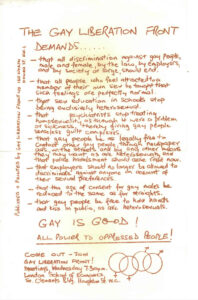
The Gay Liberation Front demands in 1970
What about single-sex spaces for lesbians and gay men?
We get messages all the time from young lesbians who are excluded from LGBT clubs because they say they’re not interested in people with penises. “Oh you’re transphobic!” they’re told. Where are they supposed to go? Why are there no places for lesbians any more? It affects gay men too. A very sad group of gay men who had their own reading club contacted us. They had run this group for years and are now being told they can’t have it anymore. They have to have trans men in there because otherwise they’re not being inclusive. They’re just totally baffled. Why are gay rights and lesbian rights going backwards? How dare anybody call this progressive! Gay men and lesbians need spaces of their own and they have a right to spaces of their own – and that we have to say this now in 2021 is an absolute outrage. We could really lose a lot here if we don’t stand together and fight against this madness.
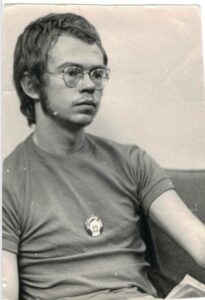
Aubrey Walter, one of the founders of the Gay Liberation Front in the UK
What is your message to the people who once marched with you in the Gay Liberation Front but now attack you?
I would say that some of those who marched with us then see us, as the veteran gay rights campaigner Fred Sargeant sees us, as reviving the spirit of gay liberation. In fact quite by coincidence I was contacted just a few days ago, for the first time in half a century, by Aubrey Walter, one of the founders of the Gay Liberation Front in the UK, who edited a book about the early years entitled Come Together and now lives in Spain. He wrote to express his support for LGB Alliance. When I asked him to provide a comment for this article he wrote this: “What is our movement about if not same-sex love? Good to see LGB Alliance standing up for this principle against false gender ideologies.” – Aubrey Walter, co-founder of the London Gay Liberation Front, 1970.
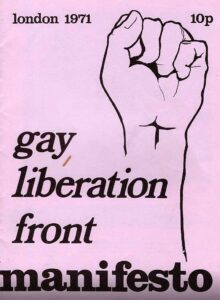
What are LGB Alliance’s plans for the future?
Reviving LGB rights everywhere. There are now 15 LGB groups set up along the same lines as ours, from Brazil to Australia, from Canada to Poland. Our aim: global revolution!
For more information about LGB Alliance go to: https://lgballiance.org.uk






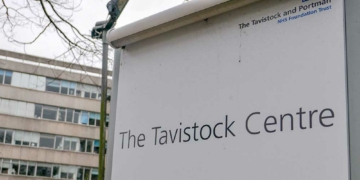










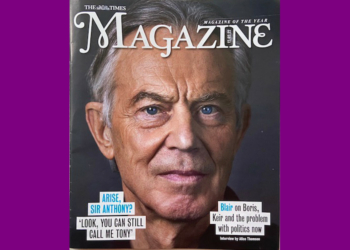
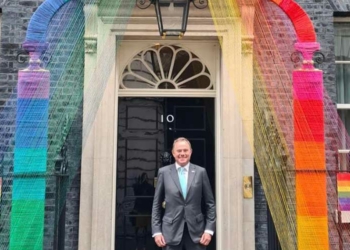





"I look back now and I think – God, we have to say the same thing again – that is insane! What on earth has happened?" sums up my thoughts and I feel so betrayed by those claiming to advocate for LGB people. However I think the tide is turning as people start critically thinking about these issues rather than accepting a be kind stance without really thinking it through.
A great article and well done Bev Jackson, what a contribution you've made to lesbian and gay history. Thank you.
Cracking read I would love to know if Bev ever met Esme
Really great to read this and learn a bit more about Bev Jackson.